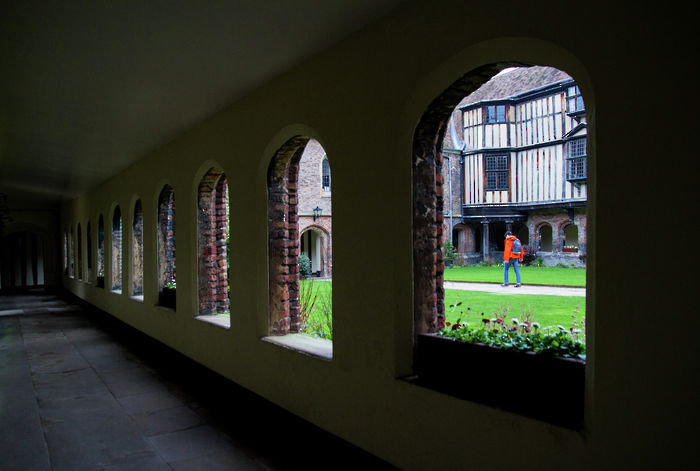Trinity Hall expressed ‘strong support’ for declassification of its green belt land
The College has described a “strong demand for employment and commercial development” at the current site, but local opposition to the project has emerged in recent months

Trinity Hall has struck a commercial deal with clothing company Next PLC, who plan to develop a large distribution centre for the company on currently green belt land owned by the College.
The site lies near Waltham Abbey in Essex, between the A121 and the M25. Local residents started a campaign in mid-June this year opposing the development, and their online petition, which was shared by Cambridge Zero Carbon on Tuesday, has gathered over 850 signatures.
A leaflet distributed by Waltham Abbey Community Campaigns claims that, should the planning application be approved, “there will be hundreds of additional vehicles on our roads causing increased congestion and pollution, a massive loss of wildlife habitat and further encroachment on the green belt”.
As well as environmental concerns, local residents are unhappy at the lack of communication by the local Council regarding the use of the site. Liam Lakes, the lead Waltham Abbey campaigner, told Varsity, “the first local residents heard about it was a leaflet through a door [followed by] a meeting on 15th May”.
Next’s planning application was submitted on 18th May. Lakes said that for that amount of paperwork and planning to have been submitted in the three day interim suggested that there was “stuff going on behind the scenes”, disregarding the feedback of the local residents.
“What they’re doing on the green belt is not at arm’s length”.
The Waltham Abbey Community Campaigns group reached out to pro-divestment student activist group Cambridge Zero Carbon last week in the hope that it might raise awareness of their campaign. He stated that while Zero Carbon’s campaign regarding the University’s divestment was an environmental issue “at arm’s length” and seemed more distant from the community, “what they’re doing on the green belt is not arm’s length”.
Paul ffolkes Davis, Trinity Hall bursar, told Varsity that the claim that college members did not have information on the deal “wouldn’t be fair”, saying: “this is all a matter of public record, and there isn’t anything strange or underhand about it”. He went on to emphasise that “the College isn’t building this… the College really owns the land”, and that it is the Council’s decision to remove the site from the green belt.
In the Bidwells report done on behalf of the College, Trinity Hall noted that it “strongly support[ed]” the release of the site from green belt status.
Cambridge Zero Carbon has harshly criticised the deal, saying: “Trinity Hall has not only shown disregard for the environment, but also for democracy, failing to consult both college members, and crucially, the local community who will face the consequences of their actions”.
In regards to the consultation of members of the College, ffolkes Davis said, “the way this College and most colleges are run is that there is a committee system”, and that this decision will have been made by the Property Committee and the Governing Body. He acknowledged that there was no consultation with students as to the use of the College’s resources prior to the deal being reached.
Ffolkes Davis said that he thought that the opposition to this development was a case of “people getting very excited” about something “prematurely” and that “isn’t that awful”, adding that the development was still in the “planning process”.
He also claimed that to his knowledge, no local residents of Waltham Abbey had tried to contact the College, nor anyone from Zero Carbon.
Aadil Siddiqi, Trinity Hall JCR green officer, said that he was currently in communications with “Zero Carbon, the JCR, and members of the governing body about the decision”.
Lakes highlighted that Next “stated they expect overall costs of the development to be around £40 to 50m” and that “if they did a quick sale and leaseback they are looking at a potential instant profit of over 100% (£50m+)”.
The deadline for objections to be made to the Council is this Friday. Ffolkes Davis commented that the Council “may decide not to take [the land] out of the green belt at all, in which case nothing will happen”.
 News / Eight Cambridge researchers awarded €17m in ERC research grants27 December 2025
News / Eight Cambridge researchers awarded €17m in ERC research grants27 December 2025 News / Downing investigates ‘mysterious’ underground burial vault 29 December 2025
News / Downing investigates ‘mysterious’ underground burial vault 29 December 2025 Lifestyle / Ask Auntie Alice29 December 2025
Lifestyle / Ask Auntie Alice29 December 2025 Sport / Hard work, heartbreak and hope: international gymnast Maddie Marshall’s journey 29 December 2025
Sport / Hard work, heartbreak and hope: international gymnast Maddie Marshall’s journey 29 December 2025 Science / Astronomical events to look out for over the break29 December 2025
Science / Astronomical events to look out for over the break29 December 2025










